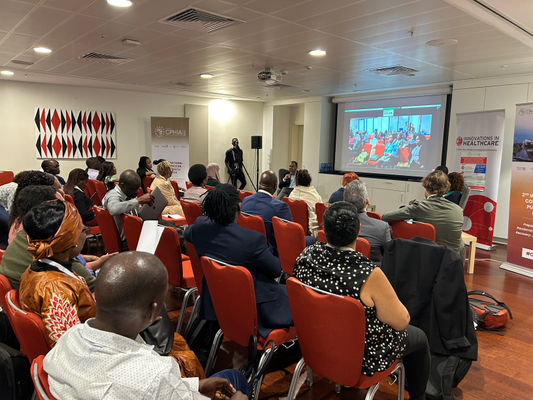Antimicrobial resistance is an urgent and significant global public health threat that undermines the ability of healthcare systems in every country to treat previously treatable infectious diseases. A recent paper published in the Lancet estimated 4.95 million deaths associated with bacterial AMR in 2019, and 1.27 million deaths attributable to bacterial AMR. 1Western sub-Saharan Africa has the highest estimated mortality rate attributable to AMR, with 27.3 deaths per 100,000. However, lack of accurate, reliable, and robust surveillance data in Africa is a significant challenge in understanding the extent and impact of AMR as well as in implementing strategies to reduce its prevalence. The 2020-2025 African Union Framework for Antimicrobial Resistance Control emphasizes that surveillance is a key priority in efforts to reduce AMR in Africa. The framework advocates for member states to collect high-quality surveillance data to track resistance and to inform clinical decisionmaking and public policy.
Towards this end, Pfizer, Inc. and Wellcome Trust set up the Surveillance Partnership to Improve Data for Action on AMR (SPIDAAR) project as a pilot in 2 hospitals each in Ghana, Kenya, Malawi, and Uganda in 2020. The objectives of the pilot are to both conduct routine isolates collection and testing on select priority pathogens in Africa, and to build capacity among clinical and microbiological service providers to conduct routine AMR surveillance. As an external partner on SPIDAAR, Innovations in Healthcare provides systems-level technical assistance to the AMR teams at the hospitals and the Ministries of Health in the four countries to leverage SPIDAAR as a catalyst for sustained AMR surveillance. Through technical assistance provided to the teams, including resources, tools, peer learning, and coaching, IiH aims to facilitate the implementation of reliable systems for detecting and reporting AMR, anticipate important trends in the evolution of resistance, and provide patients with timely, appropriate antimicrobial treatment. For Ministries of Health, robust systems to detect and analyze national AMR patterns and trends will inform policy to mitigate the impact of AMR in their countries, starting with health care delivery institutions but ultimately in the community as well.
.png)
As part of this project, IiH recently hosted a panel on the critical importance of surveillance to identify, understand, and address antimicrobial resistance in Africa at the Second International Conference on Public Health in Africa (CPHIA) in Kigali, Rwanda in December 2022. At the panel discussion in CPHIA, IiH brought together Dr. Wambulwa Benard from the Kakamega Teaching and Referral Hospital in Kenya, Dr. Watipaso Kasambara from the AMR National Coordinating Center (NCC) at the Ministry of Health in Malawi, Dr. Yewande Alimifrom the AMR One Health Unit at the Africa CDC/ African Union, and Dr. Janet Midega from the Wellcome Trust. The panel was moderated by Dr. Krishna Udayakumar from IiH who provided an overview of the AMR mortality burden in Africa and resources developed by the IiH team for the teams to be able to conduct, implement, and sustain AMR surveillance.
Key highlights from the panel include:
-
Dr. Alimi noted high levels of resistance for 5 priority pathogens from the WHO Bacterial Priority Pathogen List from the Mapping AMR and AMU Partnership (MAAP) study in Africa. Concrete recommendations to address resistance included conducting appropriate and high-quality research to estimate the true burden of AMR in Africa; developing genomics surveillance strategies in the region; and adaptive approaches to address AMR based on data and evidence, such as updating the National Essential Medicines List.
-
Dr. Midega shared that Wellcome is spearheading several efforts to improve AMR surveillance in the region by developing the right tools to collect and report accurate data on AMR, and building capacity at site and Ministry levels to collect, analyze, and use AMR data for action.
-
Illustrating the experience of Malawi in addressing AMR, Dr. Kasambaranoted that the Malawi AMR team is building on the successes and lessons from the first Malawi National Action Plan (NAP) for AMR (2017-22) to develop and implement the next NAP. Achievements from the first NAP include strong leadership at the AMR Technical Working Group; buy-in from the Ministry of Health for AMR; coordination across various sectors to address AMR using a One Health approach; building capacity at national and site levels; and using data and evidence to develop and implement policies.
-
Dr. Benard provided frontline perspectives based on his experience with implementing SPIDAAR at the Kakamega Teaching and Referral Hospital. Overcoming initial challenges with routine isolates collection and testing, the hospital has made progress in reviving antimicrobial stewardship programming at the county Ministry of Health through SPIDAAR; developing standard protocols for antimicrobial prescription and treatment; improving communication between clinical and laboratory staff; and obtaining ISO certification for the laboratory.

These discussions provide a foundation for additional progress in collaborative efforts to build sustainable local and national surveillance efforts, quality assurance, data management and timely actionable reporting, curriculum development and training, and improved antimicrobial utilization and stewardship. To watch the recording of the panel discussion, please visit our YouTube channel.

